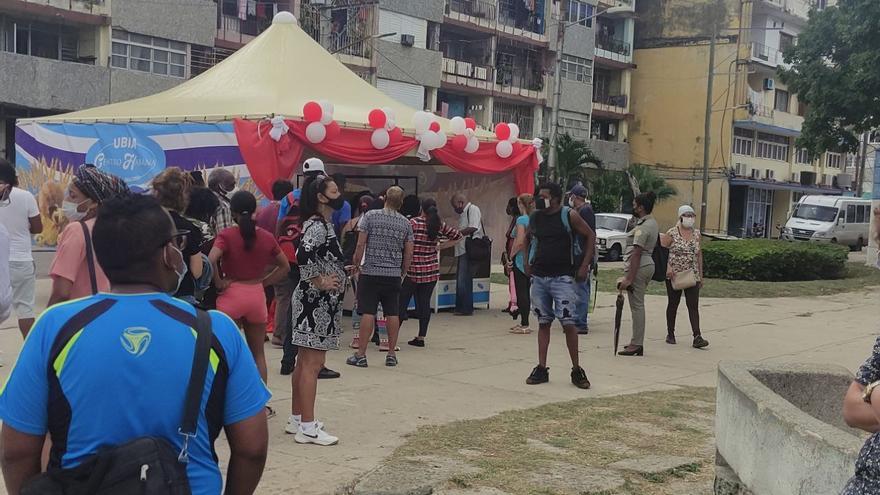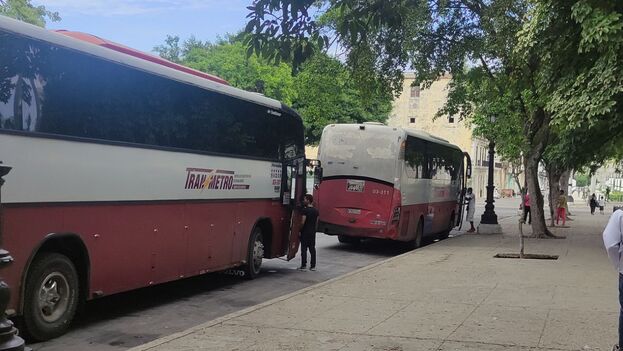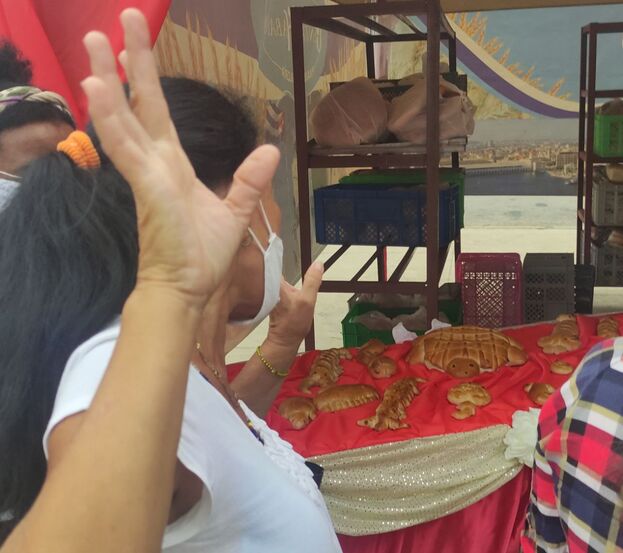
![]() 14ymedio, Juan D. Rodriguez and Natalia L. Moya, Havana, November 12, 2021 — Luz Escobar, a reporter for this publication, received a summons on Friday from the Ministry of the Interior to appear at the Office for Minors in Havana at 2:00 PM on Friday. “They’re summoning me there so it doesn’t look like State Security is behind it,” she explains.
14ymedio, Juan D. Rodriguez and Natalia L. Moya, Havana, November 12, 2021 — Luz Escobar, a reporter for this publication, received a summons on Friday from the Ministry of the Interior to appear at the Office for Minors in Havana at 2:00 PM on Friday. “They’re summoning me there so it doesn’t look like State Security is behind it,” she explains.
She is not the only one being harassed by Cuba’s political police in the days leading up to the Civic March for Change, a country-wide demonstration organized by the dissident group Archipiélago. Yadiris Luis Fuentes, a journalist with ADN Cuba, was also summoned on the same day as was chef Raul Hernandez Gonzalez Bazuk, owner the restaurant Grados, who has made statements in support of the march on social media.
Henry Constantin, director of La Hora de Cuba, reported from Camaguey that he received a citation from Etecsa, the national telecommunications company, and was fined 3,000 pesos for posts he had made on Facebook. The journalist indicated that, among them were comments critical of Decree 35 — a law that has also been criticized by the United Nations, which believe it could be used to curtail freedom of expression — and in support of demonstrations on November 15.
Activists Victor Ruiz and Omar Mena were arrested in Santa Clara, according to the Mena’s wife, along with Leidy Laura Hernandez, and taken to a police station. “They’ve just been arbitrarily arrested so I’m asking all my friends to go there and and express their concern,” Mena’s wife wrote on social media.
“The Briones Montoto sector chief just left my house,” Alexeys Blanco stated. “He told me to go with him but I refused.” Blanco, who is a member of Archipiélago group in Pinar del Rio, fears reprisals.
There are many others like them, and not just opponents, journalists and members of independent organizations. These days ordinary citizens are being subjected to repeated harassment by State Security, which is desperately trying to prevent them from joining peaceful protests.
Archipiélago says its organizers have been the subjects of at least fifty-four acts of aggression. “Since plans for the Civic March were announced in mid-August, the Cuban regime has systematically harassed activists and members of the Archipiélago group. Since then, with support from its repressive and propaganda apparatus, the harassment and attacks have not ceased,” the group reports on its Facebook page.
“I don’t think there’s been an activist who hasn’t been met at the door with a police summons, a threat, blackmail or a suggestion [from police] to take a trip,” the curator and art historian Carolina Barrero told the Spanish agency EFE. Barrero states that, in her case, police have looked for a way to persuade her not to participate in the planned protest.

Political police have been posted outside her house round-the-clock for two-hundred days to keep Barrero, who is known for her critical stance towards the government, from going outside.
In the case of Luz Escobar, the strategy has been to threaten her by using her family as leverage. “It’s not the first time State Security has tried to involve my daughters in their attempt to stop me from practicing journalism,” says the reporter. Agents have warned her not to get involved in “counter-revolution.” Otherwise, they say, she risks going to jail and not being able to see them for years.
Cubalex, a Cuban legal aid organization based in Miami, says this is part of an intense campaign to dissuade people from participating in the march, which the government has described as illegal.
“Most of the complaints we have received are over police citations and interrogations of people who have publicly stated they will participate in the demonstrations, especially those who signed a public letter of support. These are people who are being systematically harassed,” says Cubalex director Laritza Diversent.
According to Diversent, the most common threat people receive during interrogation is that they will be arrested and put on trial if they go out to protest. “They are also warned not to associate with people linked to the protest organizers or people who have publicly indicated they plan to participate,” she says.
In spite of announcements that festivities in commemoration of the 502nd anniversary of the founding of Havana would begin on Monday, event stages, pop-up markets and concerts were already operating on Friday.

At San Rafael Boulevard, Curita Park and the intersection of G Street and 23rd Avenue — all epicenters of protest on July 11 — event stages were set up with music blaring at full volume. No one was dancing.
“They’re trying to cool down the hot zones,” said one passerby, who was taking in the scene on San Rafael, where prices were astronomical. For example, a few disposable razors were selling for 60 pesos while the triple-blade razors were going for 150. “No one is commemorating or celebrating anything,” claimed one area resident. “And no one is buying the few things they’re selling,” he added.
Twenty-third Avenue is being taken over by plainclothes police. Their presence is particularly noticeable at the intersection with J Street, where El Quijote Park is located. Yunior Garcia Aguilera, one of the leaders of Archipelago, announced that he would begin a solitary march from this park on Sunday.
A few days after 14ymedio reported on the shortage of buses in the capital, the number of vehicles one could see on Havana’s streets on Friday was staggering. Absent, however, were the the usual crowds waiting at bus stops. Similarly, the long lines of people waiting to get into retail stores, normally a daily occurrence here, were nowhere to be seen.
____________
COLLABORATE WITH OUR WORK: The 14ymedio team is committed to practicing serious journalism that reflects Cuba’s reality in all its depth. Thank you for joining us on this long journey. We invite you to continue supporting us by becoming a member of 14ymedio now. Together we can continue transforming journalism in Cuba.
